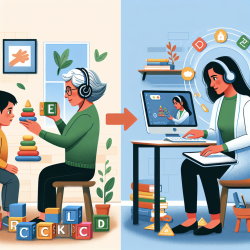The importance of effective grief interventions cannot be overstated, especially when it comes to supporting older adults who have lost their partners. The research article "A Web-Based Self-help Intervention for Coping With the Loss of a Partner: Protocol for Randomized Controlled Trials in 3 Countries" offers valuable insights into the efficacy and acceptance of web-based self-help interventions for grief. Here, we will explore how practitioners can implement these findings to enhance their skills and improve outcomes for their clients.
Understanding the Study
The study aimed to evaluate the clinical efficacy and acceptance of a web-based self-help intervention designed to support the grief process in older adults who have lost their partners. Conducted across three countries—Switzerland, the Netherlands, and Portugal—the study compared standardized and self-tailored delivery formats of the intervention. The trials focused on older adults aged 60 and above, who had lost their partners and were seeking help for grief symptoms, psychological distress, and adaptation issues.
Key Findings
- The intervention significantly decreased grief symptoms, depression, and loneliness.
- Self-tailored interventions led to higher satisfaction and better outcomes compared to standardized formats.
- Technology acceptance was high among older adults, making web-based interventions a viable option.
- The intervention was cost-effective, offering a scalable solution for grief support.
Practical Applications for Practitioners
Practitioners can leverage these findings to improve their own interventions and support mechanisms for grieving clients. Here are some actionable steps:
1. Incorporate Self-Tailored Interventions
The study found that self-tailored interventions led to better outcomes and higher satisfaction. Practitioners should consider offering flexible, customizable therapy modules that allow clients to address their specific needs and progress at their own pace.
2. Utilize Technology for Accessibility
Web-based interventions provide high accessibility, flexibility, and privacy. Practitioners can adopt similar platforms to reach clients who may have mobility issues or live in remote areas. Ensuring that the technology is user-friendly and offers technical support can enhance client engagement.
3. Focus on Comprehensive CBT Techniques
The intervention incorporated key CBT elements such as exposure, cognitive reappraisal, and behavioral activation. Practitioners should integrate these techniques into their therapy sessions to address various aspects of grief, from confronting the loss to developing new routines.
4. Conduct Regular Mood Self-Checks
Regular mood assessments can help track clients' progress and identify any signs of severe distress. This enables timely interventions and adjustments to the therapy plan, ensuring continuous support.
5. Measure Outcomes and Satisfaction
Practitioners should use validated scales to measure grief, depression, and loneliness before, during, and after the intervention. Collecting feedback on user satisfaction can provide insights for further improving the therapy process.
Encouraging Further Research
The study highlights the need for ongoing research to refine and validate web-based interventions for grief. Practitioners are encouraged to contribute to this growing body of knowledge by conducting their own studies and sharing their findings. Collaboration with academic institutions can also provide access to resources and expertise, enhancing the quality of research.
To read the original research paper, please follow this link: A Web-Based Self-help Intervention for Coping With the Loss of a Partner: Protocol for Randomized Controlled Trials in 3 Countries.










